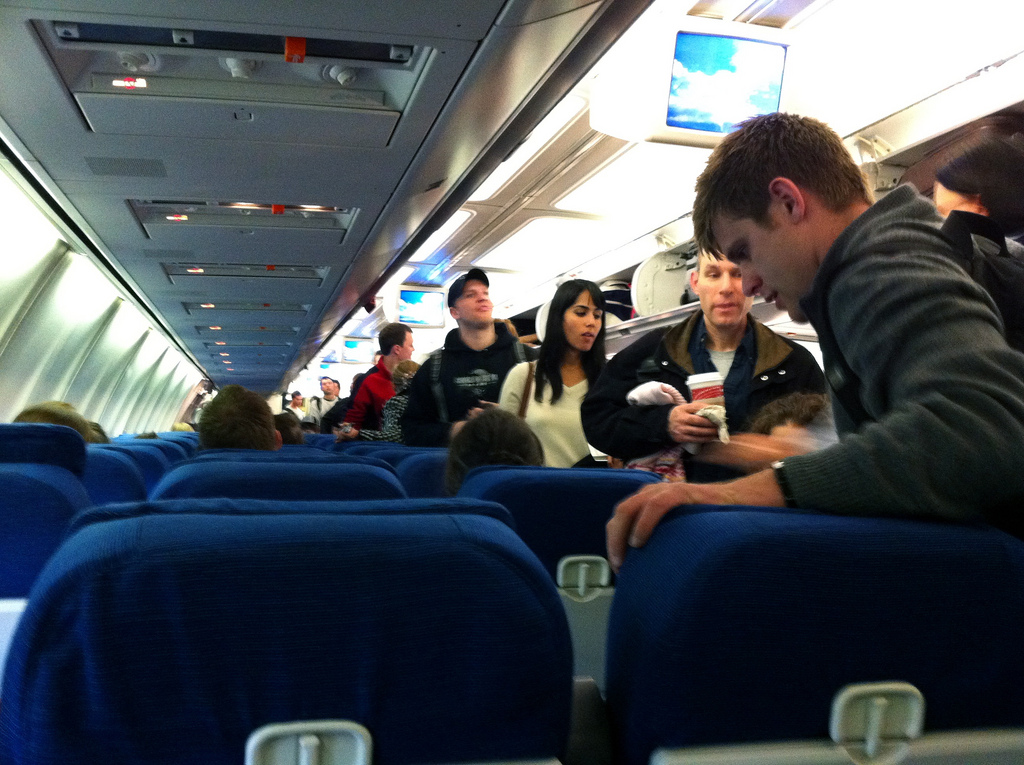
Many groups are offering students awards and grants to travel to APA Convention Aug. 4-7, 2016 in Denver, Colorado. (Image source: MattHurst on Flicker. Some rights reserved.)
Let’s face it. You’re eager to travel to APA Convention in Denver, Colorado this August — and we’re eager to meet you! To make the journey less burdensome on your wallet, I compiled a list of travel offerings from across APA’s many departments, committees, divisions, and caucuses, as well as groups outside APA. In some cases, you’ll need to be a presenter, and in other cases, you won’t. This list is meant to complement our other strategies to save. If you hear of any further opportunities, send details my way, and I’ll update this blog posting. [Last updated: 5/10/16]
From APA
APAGS: Offers two grants/awards:
- We’re offering 5-7 students the opportunity to participate in a yearlong leadership institute, which includes $500 in reimbursement to attend APA Convention. Applications due April 1. While this is not a convention travel award — and does come with significant commitment on your part — it is one way we’re hoping to expose students to all the important career leadership and networking opportunities that exist in Denver.
- A second — albeit indirect — way to obtain up to $500 reimbursement for Convention is to be the one lucky nominator of a faculty member who is selected as the Raymond D. Fowler Awardee for Outstanding Contribution to the Professional Development of Graduate Students. Applications due April 1.
American Psychological Foundation: Offers two grants/awards:
- $1000 via the Paul E. Henkin School Psychology Travel Grant to a student member of Division 16 who demonstrates a commitment to pursuit of a school psychology career. Applications due April 15.
- $300 via the Ungerleider/Zimbardo Travel Scholarships for 7 graduate students to present their papers at Convention. The award serves as an additional stipend for a small number of students who receive the APA Student Travel Award administered by the Science Directorate; see below.
Science Directorate: Offers around 100 Student Travel Awards of $300 each for graduate student travel to present research at APA Convention. Applications due April 1. In addition, approximately seven students who applied for a travel award will receive an Ungerleider/Zimbardo Travel Scholarship of $300 from the American Psychological Foundation, helping a total of 107 students attend the convention.
Children, Adolescents and Families (CAF) Caucus: Offers two 2016 student travel awards in the amount of $300. Applications due March 31, 2016. Requirements are that: 1) the presentation is relevant to children, adolescents and/or families; and 2) the student is first (or solo) author on the presentation. Applicants are to provide: 1) a copy of their accepted APA presentation; 2) a brief (approximately 250 words) statement regarding their career aspirations; and 3) a letter of recommendation from their advisor or research mentor to the Elections/Communications Chair. Please forward information to Mary A. Fristad, PhD, ABPP at mary.fristad@osumc.edu or 1670 Upham Drive Suite 460G, Columbus, OH 43210-1250 (if mailed, must be received by March 31, 2016).
Commission on Ethnic Minority Recruitment, Retention and Training in Psychology II Task Force: Offers five Travel Grants for Students of Color in Psychology up to $1000 each. Applications due May 15. The award is to assist students to participate at professional conferences, including APA Convention. If the student is presenting at APA and commits to submitting their presentation for publication, they are eligible. Again, the award is not specifically for convention.
Committee on Socioeconomic Status: Offers one CSES Leadership Award (Student Category), which includes a $500 honorarium. Applications have been extended to June 1 (and the change will soon appear online — Editor, 4/4/16). There is no requirement that it be used to attend Convention; however, awardees are recognized at Convention.
Office of International Affairs: Offers several awards of up to $500 to psychologists and psychology students based outside the U.S. and Canada, to be applied toward costs related to the APA Convention (e.g., travel expenses or registration fees). Applications due May 1.
From APA Divisions
Division 1, General Psychology: Offers 2 awards valued at $250 each, to Division 1 members. Applications due June 3. The student travel awards are to defray the cost of attending the 2016 Convention. You must be presenting at Convention under Division 1 (note: student does not need to be first author). Must be a student as of Spring 2016. Apply now! Contact Kasey Powers for questions.
Division 2, Society for the Teaching of Psychology: Offers the SAGE Teaching Innovations & Professional Development Award, one student travel grant worth $1,250. Priority application deadline is April 1. The Award is designed to defray costs for a graduate student who wishes to attend the STP (Division 2) programming at Convention. Apply now! Contact Scott Brandhorst for questions.
Division 19, Military Psychology: Offers up to 12 travel awards at $750 each. Applications are due March 31. Apply now! Contact Kevin or Div19studentrep@gmail.com (all three student reps have access to this email account and can answer questions).
Division 35, Society for the Psychology of Women: The Division’s Section IV (Lesbian, Bisexual, and Transgender Concerns) Graduate Student Committee offers one travel award of $250. Applications due May 1. Priority will be given to applicants with accepted proposals to present at Convention and those demonstrating a commitment to work with LGBTQ populations from a feminist perspective through research, practice, teaching, and/or community involvement. Apply with a 2-3 page abbreviated CV; a one-page letter of recommendation from an advisor or someone otherwise in a position to speak on the applicant’s commitment to working with LGBTQ populations from a feminist perspective; if presenting, documentation of proposal acceptance; and a two-page personal statement addressing how attending convention will benefit your professional development and goals in relation to LGBTQ feminist psychology (Please include in your statement a brief discussion of your need for funding in order to attend APA Convention, and the lack of alternative funding sources to support conference travel). Submit application as one document via email to Mary T. Guerrant, Chair of the Section IV Graduate Student Committee.
Division 44, Society for the Psychological Study of Lesbian, Gay, Bisexual, and Transgender Issues: Offers a number of awards.
- There will be 2 Dr. Richard A. Rodriguez Division 44 Student Travel Awards valued at $500 each. The award supports engagement with LGBT people of color by defraying travel cost. Applications due May 25. Download the 2016 application form.
- There will be 2 Mentoring Student Travel Awards at $500 each to support graduate student engagement with LGBTQ psychology. Applications due May 1.
- There will be 13 “APA Division 44 Student and Early Career Psychologist Engagement Awards” of $250 each. Applications due May 2016 (exact date TBD). Recipients will be required to attend Convention and volunteer in the Division 44 suite for several hours. Applicants must be either (1) a student who is enrolled for the 2016-2017 academic year; or (2) an early career psychologist who completed a psychology training program within the last three years. All applicants must also be members of Division 44. Applicants will be notified of the status of their application via email by the end of June. Submit a cover letter, application form, and CV. Application form will collect contact information, presentation information (if applicable), past attendance to APA (if applicable), past experience with Div. 44 (if applicable), and, for students, their 2016-17 school, program, degree, and year. Your cover letter should provide a description of professional goals and how attending the conference will further these goals, especially as it relates to the research and practice of LGBT concerns in psychology. Application materials must be completed and submitted electronically to Skyler Jackson and Dawn Brown by the May deadline (TBD) in order to be considered.
Division 45, Society for the Psychological Study of Culture, Ethnicity, and Race: Offers 5 Student Travel Awards at $500 each to help assist with the cost of attending APA Convention. Applications due May 31, including a recommendation letter from your advisor or mentor Accepting the travel award commits the students to attending the entire Convention. You must be a current member of the Division. Consideration will be given to those students who demonstrate the following: Leadership Experience; Conference, Presentations, and Symposiums; Publications; Public Service and Community Activities; and Awards and Scholarships. Contact Division 45 with questions.
Division 49, Society for Group Psychology and Group Psychotherapy: Offers 6 student travel awards at $500 each to members. Applications due April 15. View this info sheet (PDF) for details.
Division 54, Society of Pediatric Psychology: Offers 5 student travel awards of $750 each. Applications due May 31. The student travel award is available exclusively for travel to APA Convention. Awards are available for graduate students, pre-doctoral interns, and post-doctoral fellows who are members of the Society of Pediatric Psychology and who are the first author of a poster or paper to be presented during Division 54 programming at the APA Convention this year. To apply, please submit the following as one complete PDF document to Dr. Eleanor Mackey at emackey@childrensnational.org: (1) a one- page cover letter including your name and e-mail address, your current training institution, your primary mentor on this submitted project, a statement confirming your Division 54 membership status, and information on any other sources of travel funding for your convention participation; (2) copy of your original proposal submitted for the APA conference; and, (3) your current curriculum vitae. Contact Dr. Eleanor Mackey with questions.
Division 56, Trauma Psychology: Offers a $500 “International Student Travel Assistance Stipend.” Applications due May 1. The travel assistance stipend consists of $500 plus registration fee for the 2016 APA Convention, and is for international students enrolled in a graduate program in psychology, who are citizens of and live and study in developing countries or are citizens from developing countries studying in the U. S. and who will be presenting a trauma related poster, paper, symposium participant at the 2016 APA convention. Also included is a one year free membership in the Division of Trauma Psychology (Div. 56). This stipend is intended as partial support and matching grants or additional support from other institutions and organizations are also encouraged. Send a copy of your CV and proposal abstract that was accepted for the APA convention to: Elizabeth Carll, PhD, President-Elect of APA Trauma Psychology Division, and Chair of Div 56 International Committee, ecarll@optonline.net.
From Elsewhere
Psi Chi: Offers two awards.
- The Edwin B. Newman Graduate Research Award provides one student with $1,200 in cash from Psi Chi and $1,500 in travel reimbursement from APA to Attend APA Convention. Applications were due February 1; keep this in mind for next year!
- Unrestricted Travel Grants of up $1500 for up to 17 graduate students who are Psi Chi members. Apply for the funds before or after presenting at a conference such as APA Convention. Applications are due in early May.



